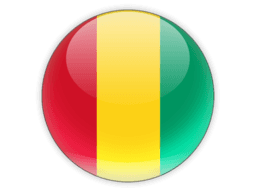
Regions of Guinea
Explore 8 regions
Cities of Guinea
Discover 47 cities across 8 regions
Boké Region(10)
Faranah(5)
Kankan Region(8)
Kindia(7)
Labé Region(5)
Guinea, officially known as the Republic of Guinea, is a country located in West Africa. It shares its borders with Guinea-Bissau, Senegal, Mali, Ivory Coast, Liberia, and Sierra Leone. The capital city is Conakry, and the official language is French. Guinea has a rich history, with evidence of human habitation dating back to the Paleolithic era.
The economy of Guinea is largely dependent on its abundant natural resources, such as bauxite, iron ore, diamonds, and gold. Agriculture also plays a significant role in the economy, with crops such as rice, cassava, and coffee being the main exports.
Guinea has a tropical climate, with a rainy season from May to November and a dry season from December to April. The country is known for its rich cultural heritage, which is reflected in its music, art, and dance. The people of Guinea are predominantly Muslim, although there are also significant Christian and animist communities.
Tourism in Guinea is not as well-developed as in other African countries, but the country has a lot to offer visitors who are interested in its history and natural beauty. Some of the most popular tourist attractions include the beautiful beaches along the coast, the Fouta Djallon plateau, and the historic town of Kindia.
Visitors to Guinea should take precautions to protect themselves from mosquito-borne illnesses such as malaria and yellow fever, which are endemic in the country. It is also recommended to take precautions against food and waterborne illnesses, as the sanitation standards may be lower than what visitors are used to. Additionally, travelers should be aware of the potential for civil unrest and crime, especially in urban areas. It is recommended to check the current travel advisory before planning a trip to Guinea.
Telephone Code
224
Local Emergency Phone
Local numbers only
Vaccinations
An International Certificate of Vaccination for yellow fever is required for travelers arriving from countries with a risk of yellow fever transmission and for travelers having transited through the airport of a country with risk of yellow fever transmission. See WHO recommendations. On 21 March 2022, the US Centers for Disease Control and Prevention (CDC) issued a Travel Alert for polio in Africa; Guinea is currently considered a high risk to travelers for polio; the CDC recommends that before any international travel, anyone unvaccinated, incompletely vaccinated, or with an unknown polio vaccination status should complete the routine polio vaccine series; before travel to any high-risk destination, CDC recommends that adults who previously completed the full, routine polio vaccine series receive a single, lifetime booster dose of polio vaccine.
Climate
Generally hot and humid; monsoonal-type rainy season (June to November) with southwesterly winds; dry season (December to May) with northeasterly harmattan winds
Currency (Code)
Guinean francs (GNF)
Electricity/Voltage/Plug Type(s)
220 V / 50 Hz / plug types(s): C, F, K
Major Languages
French, Pular, Maninka, Susu, other native languages; note: about 40 languages are spoken; each ethnic group has its own language
Major Religions
Muslim 89.1%, Christian 6.8%, animist 1.6%
Potable Water
Opt for bottled water
International Driving Permit
Suggested
Road Driving Side
Right
Tourist Destinations
Mount Nimba Strict Nature Reserve; Alcatraz Island Guinea; Badiar National Park; Belle Air Beach; Bridal Veil Falls
Major Sports
Soccer
Cultural Practices
Although direct eye contact is usually acceptable, refrain from doing so with elders.
Tipping Guidelines
Tips are appreciated, but not expected. In restaurants, if no service charge has been added, 10% is acceptable for a gratuity.
Souvenirs
Native and custom-tailored clothing, wood carvings, ceremonial tribal masks and drums, calabash gourds, leather rugs, skin care products
Traditional Cuisine
Poulet Yassa — a chicken dish made with an onion-and lemon-infused marinade
Geography
Area
total: 245,857 sq km
land: 245,717 sq km
water: 140 sq km
Climate
generally hot and humid; monsoonal-type rainy season (June to November) with southwesterly winds; dry season (December to May) with northeasterly harmattan winds
Natural resources
bauxite, iron ore, diamonds, gold, uranium, hydropower, fish, salt
People and Society
Population
13,607,249 (2023 est.)
Ethnic groups
Fulani (Peuhl) 33.4%, Malinke 29.4%, Susu 21.2%, Guerze 7.8%, Kissi 6.2%, Toma 1.6%, other/foreign 0.4% (2018 est.)
Languages
French (official), Pular, Maninka, Susu, other native languages
Religions
Muslim 89.1%, Christian 6.8%, animist 1.6%, other 0.1%, none 2.4% (2014 est.)
Population growth rate
2.75% (2023 est.)
Government
Government type
presidential republic
Capital
name: Conakry
Economy
Economic overview
growing but primarily agrarian West African economy; major mining sector; improving fiscal and debt balances prior to COVID-19; economy increasingly vulnerable to climate change; slow infrastructure improvements; gender wealth and human capital gaps
Real GDP (purchasing power parity)
$35.729 billion (2021 est.)
Real GDP per capita
$2,600 (2021 est.)
Agricultural products
rice, cassava, groundnuts, maize, oil palm fruit, fonio, plantains, sugar cane, sweet potatoes, vegetables
Industries
bauxite, gold, diamonds, iron ore; light manufacturing, agricultural processing
Exports
$10.266 billion (2021 est.)
Exports - partners
United Arab Emirates 39%, China 36%, India 6% (2019)
Exports - commodities
aluminum, gold, bauxite, diamonds, fish, cashews (2019)
Imports
$5.353 billion (2021 est.)
Imports - partners
China 39%, India 8%, Netherlands 6%, Belgium 5%, United Arab Emirates 5% (2019)
Imports - commodities
rice, refined petroleum, packaged medicines, delivery trucks, cars (2019)
International Airports in Guinea
Discover 1 major airports serving Guinea
Mark Guinea as Visited
Add Guinea to your personal travel map and track your journey around the world. Share your adventures and see your progress grow!